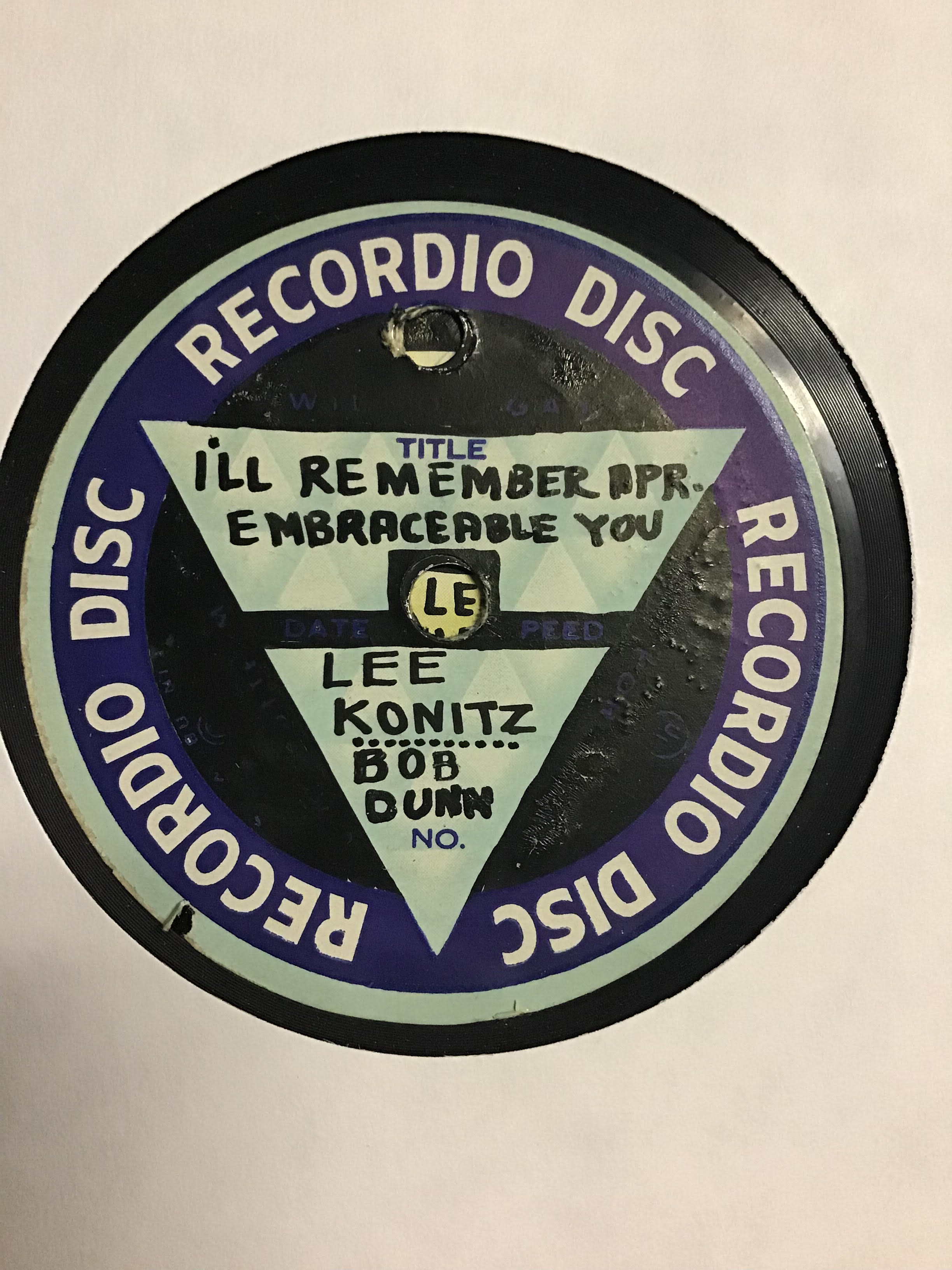Vocal-Lee: Lee Konitz Singing Jazz Standards
.jpg)
Acetate recording with Lee Konitz on vocals and Bob Dunn on piano (1945?)
For the first time, I had the pleasure of hearing Lee Konitz sing jazz standards today. These acetate recordings were brought to my attention by russjazz who purchased them from the Homemade Records section of Wolfgangs along with a number of additional acetate recordings featuring Konitz on alto saxophone from the same time period. Apparently, when Jazz Record Mart in Chicago closed, Wolfgangs purchased their entire jazz inventory, including the recordings subsequently acquired by russjazz. Lee once mentioned to me that he had briefly been a singer very early in his career, but I had no idea how fully formed he was in that fleeting endeavor being given to understatement and modesty, like when he casually mentioned one day during a nature walk that Leonard Bernstein told him the song Cool was inspired by his music. Konitz is accompanied by pianist Bob Dunn on I’ll Remember April, Embraceable You, You’re Driving me Crazy and You Are Too Beautiful. The audio quality is poor, and perhaps someone will improve that condition moving forward. The recordings must have been made in Chicago, with the year estimated to be 1945, making Konitz either 17 or 18 at the time depending on the specific date, his birthday being October 13, shared by Art Tatum and Pharoah Sanders.
Konitz believes the best way to get into jazz standards is studying the vocal interpretations of Frank Sinatra. This perspective accentuates my view that the lyrics of jazz standards are equal in importance to the music for experiencing the full import of a song's improvisational properties and possibilities. Indeed, Sinatra even said lyrics are more important with music serving as a backdrop. Jazz and popular singers from the thirties and forties are not my field of expertise. That said, I'm hearing influences from Frank Sinatra, Billy Eckstine, Mel Tormé, Louis Armstrong, Bing Crosby and Jack Teagarden even though the lack of audio quality makes differentiation rather difficult. Most stunning from these recordings is the extremely romantic nature, including conjuring the image of crooner, or should I say krooner, used as a positive here. Stunning because Konitz developed into the most abstract, austere and intellectual of all jazz greats, together with an original expression of romanticism, known as Shringara Rasa in Hindustani music, on the alto saxophone. A deeply felt romanticism has always been there, if not presented in conventional manners of the time or any time, including how Lee’s overall style has evolved through dramatic transformations, the only jazz parallel coming to mind being John Coltrane. These newly appeared vocal recordings of Lee Konitz exhibit how he absolutely had the ability to become a leading jazz vocalist if he had decided to follow that path. The same is true of his tenor saxophone playing as heard on several albums.
Lee and Gundula Konitz in their Manhattan apartment on Lee's 92nd birthday. (Photograph by Michael Robinson)
This past June, while driving with Lee through a teeming Times Square in Manhattan on a Saturday Night to the Village Vanguard, I switched on WKCR expecting to hear jazz, but there was a classical program on featuring a Wagner opera. At one point, inspired by a particular phrase, Lee began singing Wagner’s melodic idea transformed into jazz variations. It was a startling and inspired musical moment, adding to the countless such moments Konitz has gifted the world with through recordings and live performances. In the history of jazz, no artist can match his endlessly new variations within jazz standards, never repeating himself.
Above, for another special treat, here are two superlative versions of There Will Never Be Another You beginning with Frank Sinatra in tender ballad form (listening to this interpretation arranged by Axel Stordahl was my first true understanding of the song), followed by Lee's sprightly rendering with Kenny Clarke, Oscar Pettiford, Billy Bauer, Sal Mosca and Warne Marsh amounting to my very favorite instrumental recording of this jazz standard as is often the case with Konitz. The incredible, infinite diversity of realization and improvisatory interpretation jazz standards support are analogous to the ragas of Indian classical music. - Michael Robinson, November 2019, Los Angeles
© 2019 Michael Robinson All rights reserved
Michael Robinson is a Los Angeles-based composer and musicologist. His 162 albums include 149 albums for meruvina and 13 albums of piano improvisations. He has been a lecturer at UCLA, Bard College and California State University.
|